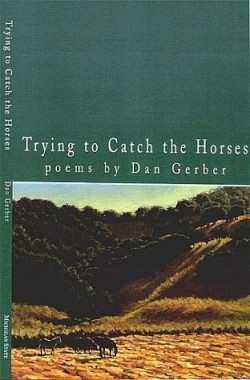Trying to Catch the Horses
Poems
Gerber has been called one of the great “sitters” of the literary world in that his poems, always uncompromisingly direct, also come from the kind of reflection that is associated with quiet meditation and the clear thought that springs from long observation and longer understanding. Like his earlier collections, A Last Bridge Home and Snow on the Backs of Horses, this collection reveals a poet influenced by the great haiku makers such as Basho and the great teacher-poets such as Rumi.
In Gerber’s poetry, a poet is found that, even when he describes the inevitable tragedies of life, seems at rest with the world without being in denial about its brutality. This is particularly true of the first haunting section of this book. For example, in speaking of a prairie tree he returns to in fall, he writes, “Something not only of itself/comes out of the tree when I see it,/Something not of me that I am./Our lives are short in the middle/and long at both ends./How strange to give up being alone.” This connection with time extends to birds, animals, plants and weather as the poems range through a rural landscape full of wide sensation and wise introspection. And many horses.
Though some of Gerber’s work, however, may be associated with the stillness of the sitter, he also reveals an acute awareness of the world traveler and a personal sense of history. Later poems in this collection move through war stories, accidents in Marrakech, loneliness in Prague and narratives of his ever favorite Key West. Still, his most beautiful work settles in the remote western reaches of this country: South Dakota, Wyoming and places where one might try to catch wild horses for decades. In these poems, where he connects wild animal with wild anima, as in “To see you naked is to see the earth swept clean of horses. But not really; swept clean for horses maybe,” Gerber becomes one of those poets readers can return to for both linguistic sensuality and a sense of place. He is one of the most adept and accessible of the poets who explore the meaning of humans? relation with earth and existence itself.
Reviewed by
Anne-Marie Oomen
Disclosure: This article is not an endorsement, but a review. The publisher of this book provided free copies of the book to have their book reviewed by a professional reviewer. No fee was paid by the publisher for this review. Foreword Reviews only recommends books that we love. Foreword Magazine, Inc. is disclosing this in accordance with the Federal Trade Commission’s 16 CFR, Part 255.

